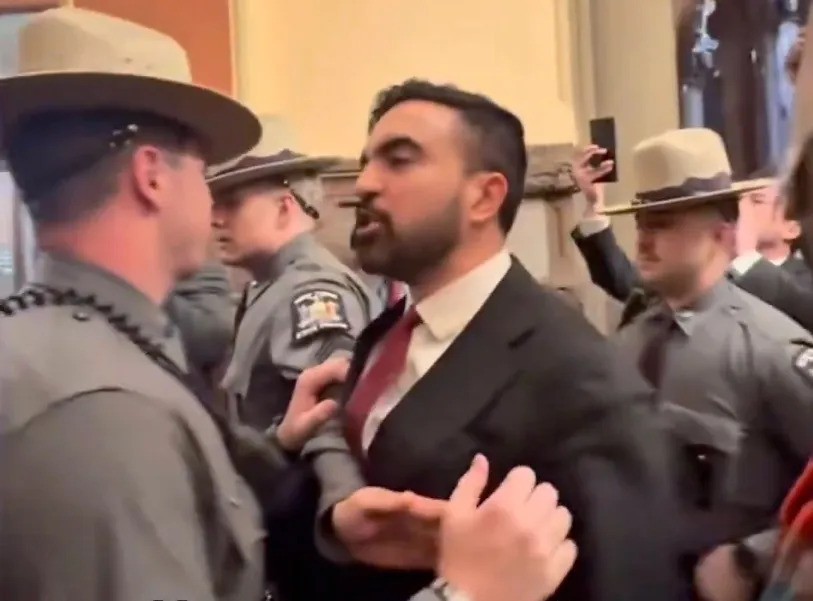|
Getting your Trinity Audio player ready...
|
Edited by: TJVNews.com
A heated political controversy is simmering in New York City’s mayoral race as socialist-leaning Assemblyman Zohran Mamdani unveils a radical proposal to create a network of government-owned and -operated grocery stores across the five boroughs. According to a detailed report that appeared in The New York Post on Saturday, the plan has provoked fierce backlash from local supermarket owners and industry advocates who warn that Mamdani’s scheme is a throwback to failed “Soviet” economic policies that could gut the city’s diverse food retail sector.
Mamdani, a progressive state legislator from Queens and a rising figure in the Democratic primary race, claims that his plan to launch five municipal grocery stores — one per borough — would slash food prices for working-class New Yorkers by eliminating private overhead and profit margins. He estimates a $60 million price tag to build the initial stores, and has floated the possibility of eventually expanding the initiative into a citywide system.
However, as The New York Post reported, the proposal is being widely condemned by those who know the food industry best: the grocers who serve New York’s vastly diverse neighborhoods. Their criticism is both fierce and unflinching.
“It’s a socialist move that goes against the American Dream,” Nallely De Jesus, VP of a supermarket chain operating in the South Bronx, told The New York Post
Jason Ferraira, a board member of the National Supermarket Association and operator of three Foodtown supermarkets in Queens, warned in comments to The New York Post that Mamdani’s proposal could lead to “Soviet-style” stores with minimal variety and long lines. The reality of government-run grocery retail, he argues, would be starkly different from the idealistic rhetoric surrounding it.
“New Yorkers enjoy having options,” Ferraira told The New York Post. “Each grocer is catering to the needs of a neighborhood, carrying different products for different ethnicities, backgrounds and incomes.” Under Mamdani’s model, he warned, shoppers might find themselves limited to “one brand or generic brands” of basic items like bread and milk — the opposite of what residents in a multicultural city expect.
De Jesus echoed this concern, stressing that diversity of product is not just a luxury but a necessity in neighborhoods like the South Bronx, where her company operates five stores. The government’s entrance into the retail grocery market, she argued, would not just risk homogenization of products but also drive out local, independent grocers who cannot compete with subsidized pricing.
Skepticism surrounding the city’s ability to run grocery stores effectively stems in part from its past performance in other public service sectors. As The New York Post report noted, critics point out that New York City has a “poor track record” when it comes to managing public housing, education, and hospitals — systems frequently plagued by bureaucracy, underfunding, and inefficiency.
Given that context, Ferraira warned that “the city would likely fail miserably in the grocery business,” according to The New York Post report. For small and medium-sized grocers already operating on tight margins, city-backed stores with price-controlled items could push them out of business — effectively consolidating food supply under the control of a government that has struggled with far less complex enterprises.
Mamdani’s proposal bears a striking resemblance to an initiative floated in 2023 by Chicago’s far-left Mayor Brandon Johnson, who proposed launching a city-run grocery store in underserved areas. As The New York Post report pointed out, Johnson has since distanced himself from the idea after a feasibility study revealed the logistical and financial risks involved.
As of 2023, only two U.S. municipalities — St. Paul, Kansas and Baldwin, Florida — operated their own grocery stores. Baldwin’s government-run store was a consistent money-loser and shuttered last year. St. Paul’s market, serving a tiny town of 600 people, generates a slim 3% profit and functions as the town’s only food source. Even Atlanta’s upcoming municipal food projects will be managed by private grocers — not the government — a key distinction from Mamdani’s fully public proposal.
Further cementing the ideological roots of the plan, The New York Post report pointed out that Mamdani’s policy appears to echo earlier proposals by Vice President Kamala Harris during her failed presidential campaign, where she floated the idea of government-enforced grocery price controls as a response to inflation.
Despite the criticism, Mamdani remains unapologetic and defiant. Speaking to The New York Post, he cited a recent poll which he says shows two-thirds of New Yorkers support publicly-owned grocery stores, claiming the public is exhausted by high prices and political inaction.
“I am proud to be the only candidate in this race with any plan to lower grocery prices,” Mamdani said. “As mayor, I look forward to bringing down the cost of food in our city.”
He further argued that a municipal grocery system would not only stabilize prices but also create hundreds of jobs and ensure food access in areas where supermarkets are closing or absent altogether. However, as The New York Post report noted, the full details of the plan remain vague, and Mamdani has yet to offer a concrete strategy for how city-operated stores would manage inventory, labor, transportation, and cultural food diversity — all critical components of the grocery business.
As the 2025 mayoral campaign heats up, Mamdani’s proposal for city-owned grocery stores has quickly become one of the most polarizing issues in the race. To supporters, it’s a bold step toward food justice and affordability. But as documented extensively by The New York Post, to industry professionals, it’s a reckless experiment with the potential to dismantle a vital network of private grocers serving one of the most diverse populations in the world.
Whether New Yorkers embrace or reject Mamdani’s vision may hinge not only on ideology but on lived experience — and whether voters trust their city government more than the corner grocer.





